Kitchen scales - an indispensable thing when you need to cook a miracle dish strictly according to the recipe or make delicious preparations for the winter. Those who follow their diet and adhere to special diets, without such a device and not do. How to choose a good balance that will cope with all the tasks and will last really long?
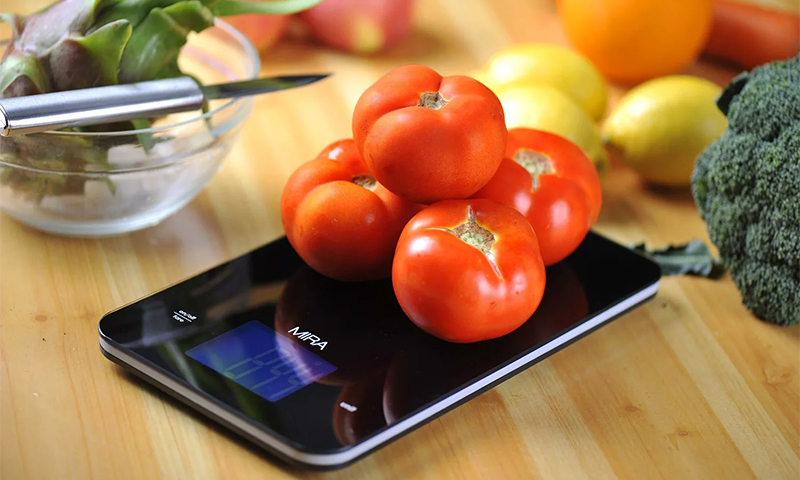
Content:
The best manufacturers of kitchen scales - which company to choose
When choosing small household appliances, we usually trust a familiar manufacturer if previous purchases were successful. Those who have no favorites yet, we advise you to focus on the list of reliable and popular brands.
Excellent electronic scales produced by the company:
- Supra;
- Zelmer;
- Rolsen;
- Polaris;
- Vitek.
Mechanical devices do well with the same Supra, as well as with Vitesse and Irit.
You can read more about these manufacturers and their most successful models in our rating. In the meantime, let's figure out what they are - the perfect kitchen scales?
The principle of operation and the device kitchen scales
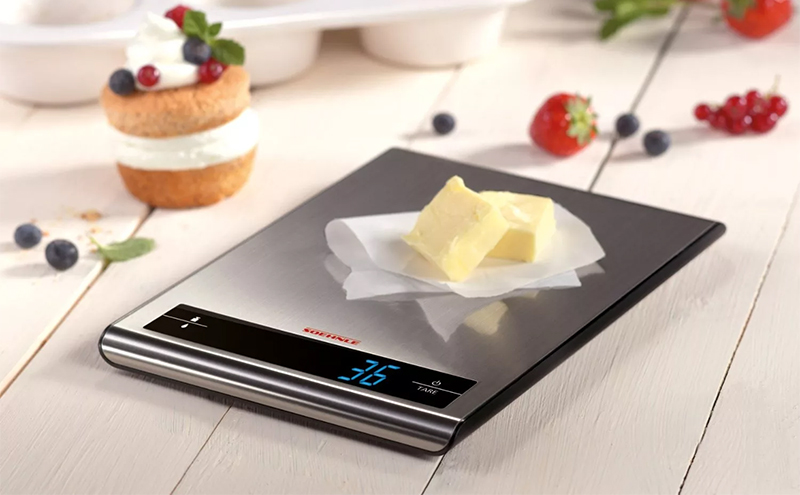
Most modern devices for weighing products differ little from floor-standing “human” models. Yes, they are smaller and more sensitive, but their internal structure is about the same.
A calibrated spring is fixed in the mechanical scales, fixed on the axis of the pointer arrow. When there is any pressure on the platform, this spiral is stretched by a system of levers, moving the arrow on the scale, and returns to its place, it is only necessary to remove the load.
Electronics works on a different principle. Here, the pressure (more precisely, the change in the position of the platform) is read by the strain gauge installed inside. He immediately converts the taken measurements into an electrical signal, which the central board decodes and displays on the display in the form of digits understandable to us.
Types of kitchen scales
Mechanical
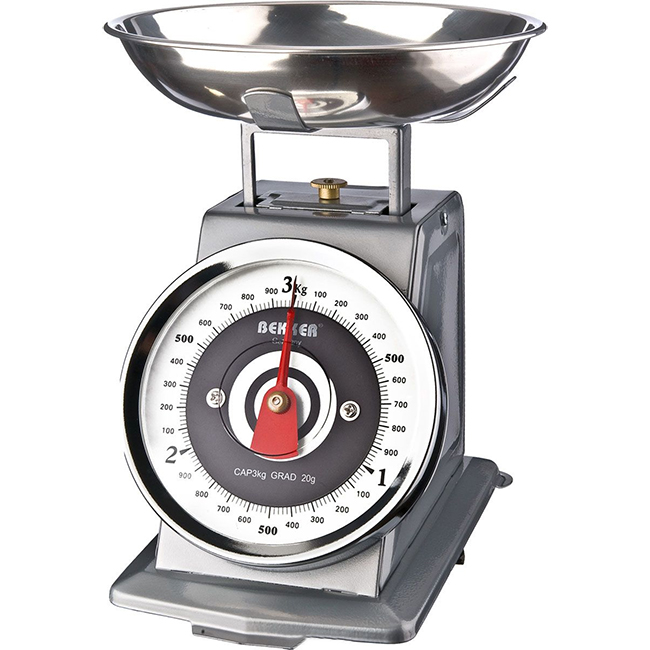
These are the simplest devices, albeit a bit cumbersome. In the kitchen, it is rarely necessary to weigh something dimensional or heavy, so for stretching the built-in spring you need a longer lever.
Household models usually come complete with a receptacle in which bulk products or all kinds of fruit and berries are loaded.
Pros:
- Simplicity and reliability of the design;
- High weighing limit up to 10-15 kg (depending on the model);
- Autonomous work - batteries such scales are not needed;
- Low cost.
Minuses:
- No additional features;
- Low measurement accuracy (from 5 to 50 grams);
- Due to the fact that the spring stretches over time, the error in the balance will gradually grow.
Electronic
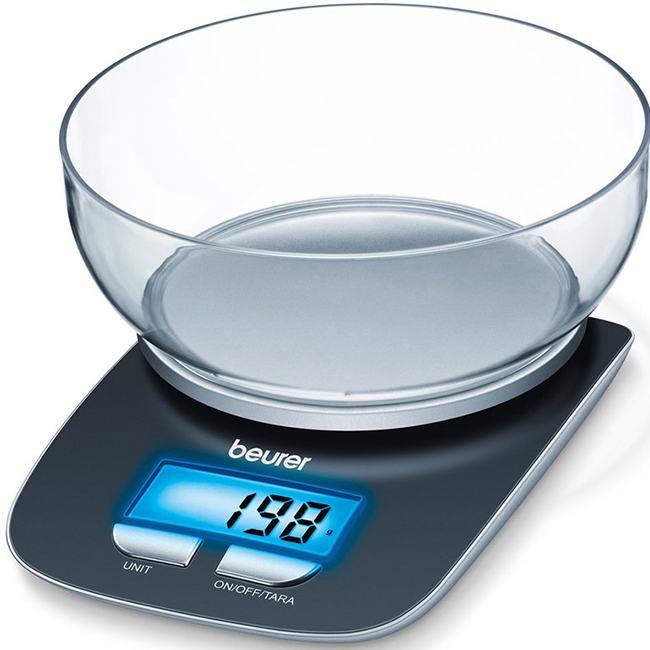
These scales are highly accurate, because they catch even a slight pressure on the platform - sometimes in tenths of a gram. Only for the work they need batteries, because the principle of their action is based on changes in the characteristics of the electric current.
Thanks to the compact dimensions of the strain gauge, support arms and circuit board with chips, such scales can be made very small or flat. Manufacturers actively use this, creating models with an unusual design and even embedding weighing systems in other kitchen utensils.
Pros:
- High weighing accuracy;
- There is no "accumulating" error;
- Small dimensions and dead weight;
- The ability to include additional features.
Minuses:
- They are powered by batteries, which will have to be changed from time to time (albeit infrequently);
- They cost at least 2-3 times more expensive than mechanical models.
Options for choosing scales for the kitchen
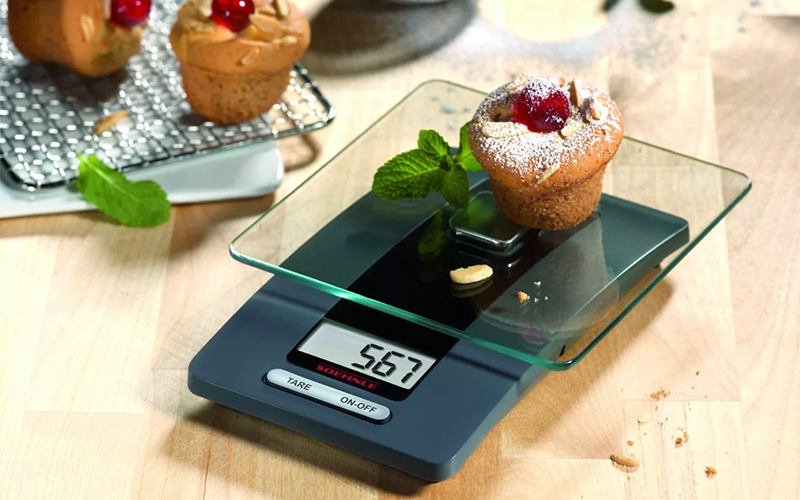
Weighing limit
This indicator is the first and most important thing you need to pay attention to when buying kitchen scales. The weighing limit indicates the maximum load that the device is capable of measuring. In mechanical models it is larger and can reach 10-15 kg.
Electronics is more “delicate”, therefore for it more often they set a maximum at the level of 3-5 kg. However, there are digital platforms with a weighing limit of up to 20 kg, but they are also more expensive.
Accuracy of measurements
Here again, it all depends on what you weigh and measure on your scales.
If you need to work with spices and determine the mass of products when cooking small portions of dishes, you will need a high accuracy of electronic scales (within 0.1-2 grams).
If you just weigh fruit-vegetables or pack up cereals, enough mechanics with the price of division up to 50 grams. And yet it is better that this indicator be smaller - then the device can be used for small portions of products.
Design features
Here we are talking not so much about the features of the hull as about the types of platforms for weighing. The most common options are the bowl and platform. In the first case, you will be able to measure the mass of piece and bulk products, although you will be limited by the capacity of the bowl.
If you choose a platform, you can weigh something larger on it (fish, bird carcasses), and for everything else, instead of a bowl, use any dishes that are in the kitchen. On sale there are also more functional scales of non-standard designs. True, usually they themselves are an additional option kitchen utensils.
Electronic weighing units can be embedded in a variety of items:
1. Spoon;
2. Chopping board;
3. Measuring cup.
Manufacturing material
What material your scales are made of does not affect their work. But the design, cost and service life depend on it directly.
Today, manufacturers offer standard materials for small household appliances:
1. Plastic is the cheapest and easiest option. It has the right to be present in the decoration of the case, but a plastic bowl will not last for a long time, especially if you plan to seriously load it.
2. Steel is expensive but durable. Excellent material for the scales themselves, and for the container. However, metal models should be protected from contact with strong acids and alkalis.
3. Glass - it is used in the manufacture of electronic scales with a platform, but you can also find models with glass bowls. In general, it is an ideal option for the kitchen - hygienic and moderately durable. But it is necessary to handle such scales carefully, since there will be nothing to replace the broken glass.
Also in the manufacture of scales can be used wood, but only as an element of the decor of the platform.
Such devices look aesthetically pleasing, but they will have to be protected from moisture, and “wet” products (raw meat, strawberries, grated vegetables) should be weighed in a separate bowl.
Additional functions
Since mechanical scales cannot have any special functions in principle, here we consider only electronic models.
To at least somehow stand out from the background of numerous competitors, manufacturers supply them with a variety of, sometimes completely unnecessary options. So, to stupid additions kitchen scales include weather sensors, alarm clocks and built-in thermometers that measure the temperature in the kitchen or even outside the window.
It makes sense to overpay for such hybrids only in one case: if you really need the declared function, but you do not want to buy another device. There are also enough useful options for kitchen scales, and here the rule already applies: the more your meter is able, the more expensive it is.
So before you buy, think carefully about what features of a smart device you will use:
1. Tarocompensation is the main function that allows you to immediately subtract from the results a lot of dishes or weighing cups.
2. Sequential weighing is a convenient option if you have to measure a large number of products in parts. The device will record all the results in memory and calculate the total weight.
3. Switching units of measurement - like those who often cooks on prescriptions of foreign publications.
4. Automatic shutdown will save battery power. Ideally, such scales will also turn on themselves under load.
For athletes and slimming ladies will be useful so-called diet scales. They are more difficult to manage and more expensive, but they allow us to calculate the caloric content of products, the content of carbohydrates, fats and proteins, and cholesterol when weighing.
What kitchen scales to choose
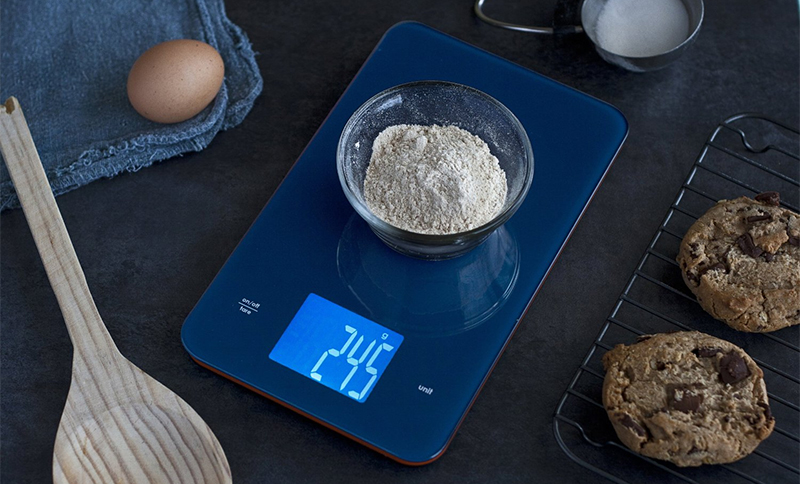
1. If the scales are needed only during the harvesting period for the winter, you can take a mechanical model with a capacious bowl not less than a liter. The “carrying capacity” of the device should be at least 5 kg, but one should not forget about accuracy either. Choose scales with a division value of 10-20 grams so that they can be used for the dosage of spices.
2. Those who use the scales daily during cooking, will suit the electronics with the platform. Weighing limit of 3-5 kg will be sufficient, the accuracy must be at least 1 gram. Check that the scale has a tare function; the use of additional units of measure will not interfere.
3. If you use scales only for dispensing spices, take a spoon-scales - it will be more convenient with it, and it will not take much space in the box.
4. People on a diet (medical, sports, or to adjust body weight) will have to fork out on a diet computer to control calories, fats and carbohydrates.
How much are the scales for the kitchen
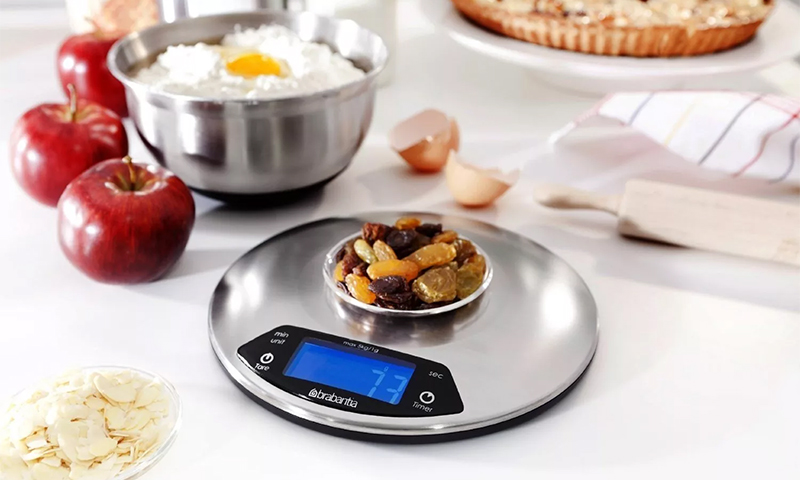
1. Prices for mechanics with a weighing bowl start from 100 rubles and reach up to 2000. Models with a platform are already more expensive - from 500 to 3000.
2. Electronic scales are sold at a price of 300 rubles, branded equipment reaches 5-7 thousand.
3. Scale spoon can be purchased for 4 hundreds.
It will be interesting to friends too





